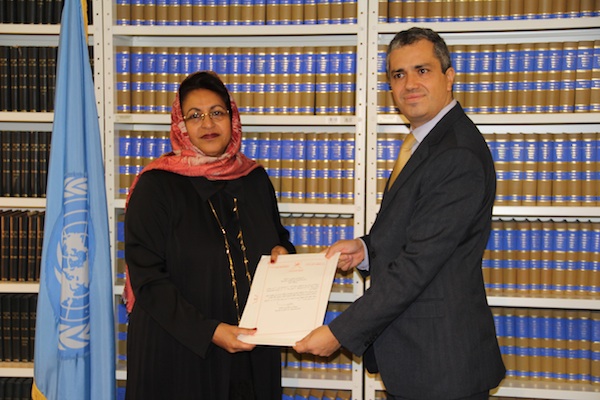20.08.2014

Ambassador Lyutha Sultan Al-Mughairy presents Oman's accession instrument in New York
Download the press release | PDF 150KB
Snapshots of Oman at the Convention's meeting on Flickr
Geneva and New York – The Sultanate of Oman has become the latest State to join the Anti-Personnel Mine Ban Convention, the landmark international treaty that bans the use, stockpiling, production and transfer of anti-personnel mines.
Oman deposited its accession instrument at a ceremony at the United Nations headquarters in New York earlier today, becoming the 162nd State to formally commit to the so-called Ottawa Convention.
“Oman is proud to have joined the vast majority of the world’s States in committing to eradicate anti-personnel mines, an indiscriminate weapon that has no place in the modern world,” said Ambassador Lyutha Sultan Al-Mughairy, Oman’s Permanent Representative to the United Nations.
“Oman’s accession demonstrates that all States from all parts of the world have a role to play in ending the suffering caused by these insidious weapons.”
Three of the six members of the Gulf Coordination Council (GCC) – Oman, Kuwait and Qatar – have now acceded to the Convention.
 In 2012, Oman reached out to the Convention’s Geneva-based secretariat, or Implementation Support Unit (ISU), which then hosted Omani officials for in-depth briefings (photo, left).
In 2012, Oman reached out to the Convention’s Geneva-based secretariat, or Implementation Support Unit (ISU), which then hosted Omani officials for in-depth briefings (photo, left).
 In February of this year, the ISU also supported a visit by special envoy Her Royal Highness Princess Astrid of Belgium to Muscat, at which time Oman’s Minister of Foreign Affairs announced that Oman would proceed in acceding to the Convention.
In February of this year, the ISU also supported a visit by special envoy Her Royal Highness Princess Astrid of Belgium to Muscat, at which time Oman’s Minister of Foreign Affairs announced that Oman would proceed in acceding to the Convention.
Photo, right, Princess Astrid of Belgium visits Oman in February 2014
“We are thankful for the support provided by the Implementation Support Unit in assisting the Sultanate of Oman with its accession process,” said Colonel Abdullah Surur Mohammed Al Kaa’Bi, who represented the Sultan of Oman's Armed Forces at today’s event in New York.
“We are confident that we can count on the ISU’s continued expert assistance in the fulfilment of our obligations as a State Party to the Convention.”
“Oman’s accession will strengthen the international movement to end the suffering and casualties caused by Anti-Personnel Mines,” said Kerry Brinkert, the Implementation Support Unit’s Director.
“Oman will add new energy and perspectives at an important to time in the life of the Convention,” added Kerry Brinkert, noting that, at the Convention’s Maputo Review Conference in June, the Convention's States Parties committed to intensify efforts to clear mined areas and to assist landmine victims, and expressed their aspiration to meet their goals to the fullest extent possible by 2025.

Delegation of Oman at the United Nations in New York and the Convention's ISU Director
The Convention will enter into force for Oman on 1 February 2015. Within 180 days of that that date, Oman will be required to report on any stockpiled anti-personnel mines under its possession and any mined areas in its jurisdiction.
The ISU is mandated to advise and support States Parties in the implementation of the Convention.
This includes the ISU assisting States in preparing transparency reports, advising States in incorporating the Convention’s promise to landmine survivors into broader approaches to disability and human rights, and supporting States which are in the process of clearing mined areas in providing clarity in accordance with Convention obligations.
The Anti-Personnel Mine Ban Convention was adopted in Oslo in 1997, opened for signature in Ottawa the same year and entered into force on 1 March 1999.
Since that time, millions of square metres of once-dangerous lands have been released for normal human activity and more than 47 million stockpiled mines have been destroyed.
For press inquiries, contact: Laila Rodriguez press(at)apminebanconvention.org, +41 (0) 22 730 9350. Find the Convention on Facebook, Flickr and Twitter.